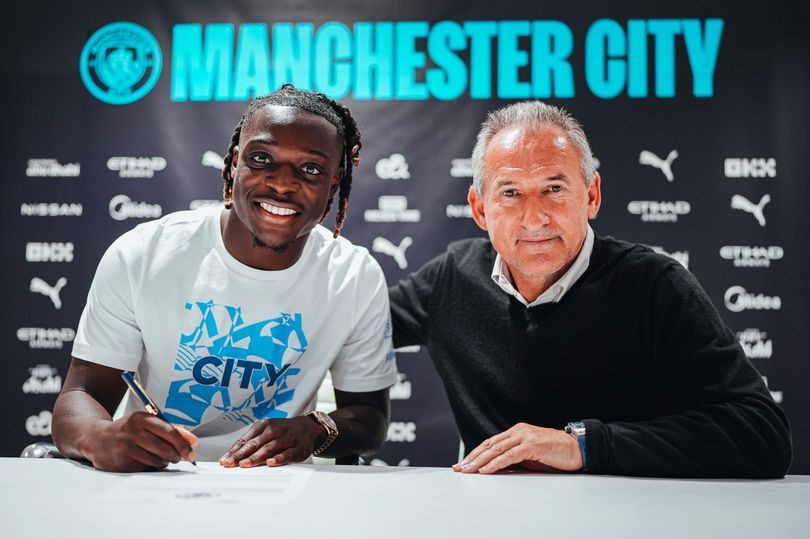Manchester City fans are waiting anxiously to hear news of transfers this summer, but they have reason to be positive over the future.

Jeremy Doku signs for Manchester City on a five-year deal, joined by director of football Txiki Begiristain (Image: Man City)
Manchester City won’t be rushed on transfers this summer, and the early signs point towards a quiet window when it comes to incomings.
There are longer-term concerns over the midfield, with Bernardo Silva still open to leaving and Kevin De Bruyne’s contract up in 12 months. Ederson is linked with a move away this summer, while the general age profile of the squad is getting older. Pep Guardiola also has a year left on his deal, so the next 12 months will be crucial in terms of setting the direction for the next few years at the Etihad.
That reality is nothing new for clubs like City, who plan their strategy years in advance. The slow progress this summer will have been factored in and contingencies accounted for.
When the signings do kick in and the replacements for key men arrive in the coming transfer windows, City have already made clear what kind of players they will target.
Last summer, when seeking a replacement for Riyad Mahrez, they picked Jeremy Doku – a throwback winger who takes men on and boasts raw pace as one of his main weapons. Erling Haaland arrived two years ago, another traditional player in his position. Add the development of Phil Foden, the persistence with Kyle Walker and the signings of others like Julian Alvarez, and one theme tying these key players together is a quicker, more direct style of player across the pitch.
It ties in with the mission of academy director Thomas Krucken, hired last summer after pitching his ‘Player of the Future’ ethos to Txiki Begiristain and co. Speaking to MEN Sport during the season, Krucken explained why he is seeking to overhaul the academy to develop faster, more physical players to be first-team ready in a decade’s time.
“We believe the speed of the game will increase, that’s for sure,” he said in March. “When you think about the past when Shaun Goater played up front with Paulo Wanchope and Richard Dunne was doing all he can on the defensive side. It was a totally different game.
“To get a common idea of what is next – the speed of the game will increase so what does it mean for football, physically and social and psychological aspects? Bring those ideas together and create a new programme for the players to make a difference.”
The work to create an academy capable of producing those players has already begun. An Academy Summit brought together departments from across the club and City Football Group to contribute to a plan to develop that ‘player of the future’. Speakers have been brought in to educate coaches on the needs of the youngsters who will be City’s next generation.
And from next season, academy players will take part in other sports to improve various aspects of their footballing development.
With City backing Krucken to develop the player of the future, it makes sense for the first team to also work towards a similar profile of player – ready for the academy players to slot into seamlessly. So there may be little noise on the transfer front, but expect the kind of player who eventually arrives to start to pivot in the direction of pace and power.
